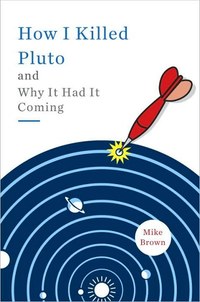Review: How I Killed Plutoby Jeff Foust
|
| Brown describes the up and downs of his years of work searching the outer solar system, from the setbacks and false alarms to the elation of finding something no one else had ever seen before. |
Despite the title of How I Killed Pluto and Why It Had It Coming (or even his username on Twitter, “plutokiller”), Mike Brown makes it clear that his actions towards the former ninth planet were not malevolent. In fact, as he writes early in the book, “I had started looking for planets by accident.” As a new assistant professor at Caltech, with access to its observatories, he decided to embark on a search of the Kuiper Belt in the outer solar system to see what large objects—planets, even—might exist out there. That search, over the next several years, eventually uncovered a number of such Kuiper Belt objects (KBOs), eventually finding one, nicknamed “Xena” but later formally named “Eris”, slightly bigger than Pluto. That made it the tenth planet, right?
As Brown writes, even though he agreed at the time of its announcement (which was rushed because of a controversy with Spanish astronomers over the discovery of another KBO, which he recounts in the book in detail as well) that Xena was the tenth planet, he was struggling to define the term in his head. He went so far as to prepare four different press releases, depending on what the IAU decided: if the solar system had eight, nine, ten, or more planets. Despite being at the time the discoverer of the tenth planet, he agreed “much more strongly” from a scientific standpoint with the eight-planet release. “Eight planets made sense if you were a scientific historian and realized that 150 years ago people had already decided to divide the solar system’s objects into big planets and small asteroids and that Pluto—and now Xena, too—thoroughly fit into the category of the small objects.” He was unimpressed with the proposal to bestow planet status on any object orbiting the Sun large enough to be in hydrostatic equilibrium (that is, be round), calling it “an attempt to legislate an entirely new and never before anticipated meaning for the word planet.” (However, the idea of defining planets in that manner had been proposed in the literature at least as far back as the early 1990s.)
In the end, while Brown’s discovery of Xena forced the issue of how to define a planet, he was not involved in the IAU’s final decision: having never joined the organization, he remained in Pasadena while the IAU met and voted on the proposed definition in Prague. He got his wish: the IAU’s definition has given us an eight-planet solar system, even though that means denying him the honor of discovering a planet. Brown recalls watching the IAU’s proceedings via webcast in a Caltech auditorium with members of the press. When the final tally on the IAU resolutions on planet definition were made, he turned to the media and pronounced, “Pluto is dead.”
Even those who still pine for the days when Pluto was considered a planet will enjoy reading How I Killed Pluto and Why It Had It Coming. The book is best described as a scientific memoir: he describes the up and downs of his years of work searching the outer solar system, from the setbacks and false alarms to the elation of finding something no one else had ever seen before. But it’s also a very personal story, as he describes during this time getting married and becoming a father. Brown started this search, he writes, because he believed that there were planets yet to be discovered in the outer solar system, even betting a friend five bottles of champagne that one would be found by the end of 2004 (a bet he won with the discovery of Eris—thanks to a five-day extension of the bet, as the world was first seen in early January 2005—even though it was later classified along with Pluto as a dwarf planet.) Brown, though, continues to search, looking for even larger worlds that might still lurk in the outer fringes of the solar system, an effort that someday may make him the discoverer of the ninth planet.
